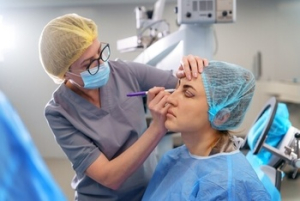What Is The Success Rate Of Glaucoma Surgery? Key Insights
Glaucoma is a serious eye problem that can cause people to lose their sight. It often gets worse without any clear signs until it’s too late. Surgery can help when other treatments, like medicine or laser treatment, don’t work. But what is the success rate of glaucoma surgery?
This article talks about how well glaucoma surgery works and what to expect.
Understanding Glaucoma And The Need For Surgery
Before talking about glaucoma surgery, we should know what glaucoma is and its types. We should also know why surgery might be necessary.
What Is Glaucoma?
Glaucoma happens when the nerve in your eye gets hurt and can’t send messages to your brain. This can happen if the pressure inside the eye gets too high. Glaucoma often gets worse slowly and may not have signs until it is too late.
Types Of Glaucoma
There are different types of glaucoma, but they all hurt the eye’s nerve and can cause vision loss. Here are the most common types:
- Primary Open-Angle Glaucoma: This is the most common type. It happens when the eye’s drainage system doesn’t work well. This causes pressure to build up inside the eye, but it happens slowly. Most people don’t notice it until the damage is already done.

- Angle-Closure Glaucoma: This type happens when the drainage area becomes blocked fast. It causes a sudden rise in intraocular pressure (IOP), which can be very painful. It needs to be managed right away to avoid serious damage to the eye.
- Normal-Tension Glaucoma: In this type, the IOP is normal, but the nerve still gets damaged. Doctors don’t know why this happens, but it can cause vision loss.
- Congenital Glaucoma: This is a rare type of glaucoma that babies can be born with. It happens when the eye’s drainage system doesn’t form the right way. This condition can damage the eye’s nerve, so babies with it need treatment early.
- Secondary Glaucoma: This type happens because of another problem in the eye. These issues can be an injury, infection, or other health conditions like diabetes. It can cause the pressure inside the eye to rise.
Each type of glaucoma needs a different plan, so it’s important to know which type you have. Regular eye check-ups can help you find it early and stop damage to your vision.
When Is Glaucoma Surgery Needed?
Many times, glaucoma can be handled with medicine. But surgery might be necessary if the medicine doesn’t help enough. Surgery helps lower the pressure inside the eye and stops the nerve from getting worse.
Doctors do surgery to make sure the pressure stays low and helps protect vision. The type of surgery depends on how bad the glaucoma is and the patient’s health.
Surgical Options For Glaucoma
There are different surgeries to help lower eye pressure. The doctor will choose the best one based on the patient’s needs.
Minimally Invasive Glaucoma Surgery (MIGS)
MIGS is a new type of surgery that uses small cuts and heals faster than older methods. MIGS works best for people with mild to moderate glaucoma.
But MIGS doesn’t work well for people with very bad glaucoma, who might need stronger treatments.
Laser Surgery
This option is also called SLT (Selective Laser Trabeculoplasty). Laser surgery uses a specific light to help the eye drain fluid and lower pressure.
Laser therapy is less invasive and has a faster recovery time than regular surgery. It helps many people, but it may not work forever. Some people might need more treatments later.
Success Rate Of Glaucoma Surgery
How successful surgery is depends on many things. Most surgeries work well to lower IOP without further medical therapy, but sometimes more treatment is necessary.
MIGS surgeries usually have good results, especially for people with mild glaucoma. But, they might not work as well for those with very advanced glaucoma.
Factors Influencing The Success Rate Of Glaucoma Surgery
The success of glaucoma surgery can depend on many things. Knowing these factors can help you understand what to expect and how to care for your eyes after surgery.
Stage Of Glaucoma
People with early glaucoma do better with surgery than people with severe glaucoma.
Type Of Surgery
MIGS works better for mild cases, while other surgeries may be needed for more severe cases.
Postoperative Care
Following the doctor’s instructions after surgery is important. Because this is the only way you can make sure the surgery works as planned.
Long-Term Success And Stability
Long-term success means the IOP stays low, and you may not need more surgeries. Many people who have surgeries stay stable, with only a few needing more treatments.
Complications Of Glaucoma Surgery
Glaucoma surgery can protect your vision but has risks like any surgical procedure. Knowing what could happen helps you take the right steps during recovery. Here are some possible risks and how to manage them.
Infection
Infections can happen after any surgery, including glaucoma surgery. If germs get into the eye, it can cause swelling, redness, and pain.
Cataract Formation
Some types of glaucoma surgery might make cataracts more likely to develop in the future. A cataract is when the clear lens in your eye becomes cloudy, making it harder to see.
Surgical Failure
Sometimes, the surgery doesn’t work as planned. The pressure in the eye might not go down enough, or it could go back up after some time.
Eye Pressure Too Low
If the pressure drops too much, it can cause problems with vision. Doctors can treat this if it happens.
Fluid Leaks
Sometimes, fluid can leak from the surgical site. Your doctor will watch for this during check-ups and treat it if needed.
Scarring
The eye can sometimes heal in a way that blocks the drainage system. This might need more care or treatment later.
Steps To Expect During Glaucoma Surgeries
If you need surgical treatment for glaucoma, it’s normal to wonder what will happen. Here’s what happens during MIGS and SLT.
Consultation With Your Doctor
Before surgery, you will meet with your eye doctor. They will check how serious your glaucoma is and decide which surgery is best for you. During this visit:
- Your Eye Exam: The doctor will check the pressure in your eye and look at the nerve that helps you see.
- Your Treatment Plan: They will explain the surgery and how it can help protect your vision.
- Your Questions: You can ask any questions to understand surgical techniques better.
SLT Laser Surgery
 If SLT is the best choice, this is what happens:
If SLT is the best choice, this is what happens:
- Getting Ready: The doctor will put eye drops in your eyes to numb them so you won’t feel anything.
- Using The Laser: A gentle laser light addresses the part of your eye that drains fluid. This helps the fluid flow better and lowers the pressure in your eye.
- Quick And Simple: The laser treatment only takes a few minutes. There are no cuts or stitches, so you recover fast.
- Follow-Up Care: Your doctor will check your eye pressure during follow-up visits. Sometimes, you might need another laser treatment later.
MIGS Surgery
If you need MIGS, this is what will happen:
- Preparing For Surgery: The doctor will give you numbing drops. Sometimes, they will give you medicine to help you feel calm during the surgery.
- Tiny Tools And Small Openings: The doctor uses very small tools to make tiny openings in your eye. These openings help the fluid drain out, which lowers the pressure.
- Cataract Surgery: If you also have cataracts, MIGS can be done at the same time. This allows you to handle both problems with one surgery.
- Healing And Recovery: MIGS uses very small cuts, so healing is usually quick. You must use eye drops or medicine to help your eye heal.
After Surgery
No matter which surgery you have, taking care of your eyes afterwards is very important.
- Postoperative Interventions: Use glaucoma medications to avoid infection and boost healing. Follow your doctor’s orders to get the best possible results. You will also need follow-up visits to check your progress.
- Follow-Up Period: See your doctor to check your eye’s pressure. Regular visits will help keep things on track and catch any problems early.
Frequently Asked Questions (FAQs)
How long does it take to recover from glaucoma surgery?
Recovery time depends on the surgery. Glaucoma patients may heal soon after, but it may take weeks or months for a full recovery. Follow-up visits are important during this time.
Can glaucoma surgery restore lost vision?
No, glaucoma surgery cannot bring back vision lost because of nerve damage. But it can stop further vision loss and help protect the sight you still have.
Will I need glasses after glaucoma surgery?
It depends. Glaucoma surgery doesn’t fix vision problems like short-sightedness or long-sightedness. If you wore glasses before surgery, you might still need them afterwards.
Can glaucoma surgery cure my glaucoma?
No, glaucoma surgery doesn’t cure glaucoma. It helps lower eye pressure to prevent further damage to your optic nerve. This protects your remaining vision but cannot restore already lost vision.
What happens if I skip my eye drops after surgery?
Skipping eye drops can increase the risk of infection or inflammation. It may also slow healing. It’s important to use them exactly as your doctor advises.
Conclusion
 The success rate of glaucoma surgery is great, and patients may do well in lowering their IOP. Yet, surgical success depends on the surgery, how bad the glaucoma is, and following the doctor’s care plan. By learning about the benefits and risks, you can make the best choice to protect your eyes.
The success rate of glaucoma surgery is great, and patients may do well in lowering their IOP. Yet, surgical success depends on the surgery, how bad the glaucoma is, and following the doctor’s care plan. By learning about the benefits and risks, you can make the best choice to protect your eyes.
If you or someone you know has glaucoma or needs surgery, we are here in Melbourne to help. Our friendly team can answer your questions, explain your options, and give you the care you need.
Call Mornington Peninsula Eye Clinic now at (03) 9070 3580 to book a visit and learn how we can help protect your eyes. Your vision is important!
Note: Any surgical or invasive procedure carries risks. Before proceeding, you should seek a second opinion from an appropriately qualified health practitioner.
Sources:
Boyd K 2024. What Is Glaucoma? Symptoms, Causes, Diagnosis, Treatment Goyal A, editor. American Academy of Ophthalmology. Available at: https://www.aao.org/eye-health/diseases/what-is-glaucoma [Accessed December 11, 2024]
Markham S 2021. What Is MIGS? Glaucoma Research Foundation. Available at: https://glaucoma.org/articles/what-is-migs [Accessed December 11, 2024]
National Eye Institute 2024. Laser Treatment for Glaucoma. National Eye Institute. Available at: https://www.nei.nih.gov/learn-about-eye-health/eye-conditions-and-diseases/glaucoma/treatment [Accessed December 11, 2024]
Puig M 2021. Complications and Management of Glaucoma Filtering Treatment & Management. Medscape. Available at: https://emedicine.medscape.com/article/1207755-treatment [Accessed December 11, 2024]
Winderl A Marturana 2023. A Guide to Glaucoma Surgery. Health. Available at: https://www.health.com/condition/glaucoma/glaucoma-surgery [Accessed December 11, 2024]







Leave a Reply
Want to join the discussion?Feel free to contribute!